A week after Facebook banned a group of prominent far-right influencers for violating its policies against "dangerous individuals and organizations," the company has removed another page that was being used to circumvent the ban.
Facebook took down the page after being asked about it by National Observer.
The now-removed Facebook page is associated with a website called "Summit News," which is run by Paul Joseph Watson, editor of the controversial website Infowars. Summit News hosts all of Watson's content, much of which is cross-posted verbatim on Infowars.
Both Watson and Infowars were banned from Facebook last week, but Watson was circumventing the ban by repackaging his content under a different brand name and posting it on the platform. A week after his initial ban from Facebook, his content was still available on the platform, through Summit News' Facebook page.
Why should Canadians care about this U.K.-based media personality?
- He's part of a global far-right media network with an epicenter right here in Canada.
- That same network is a hub for disinformation, and with elections approaching, Canada is likely to be its next target.
- He's just one example of a broader problem: As social media cracks down on extremism and disinformation, the far-right media ecosystem keeps coming up with new ways to circumvent the policies.
Why should Americans care about this U.K.-based media personality?
- He’s the editor of the U.S.-based website Infowars, one of the most influential platforms in the alternative media ecosystem, and a major hub for conspiracy theories, disinformation, and Islamophobic content.
- He is no longer confined to the fringes of the internet. U.S. President Donald Trump has repeatedly shared his content on Twitter, and even mentioned him by name in a recent tweet.
- He has provided a huge platform for some of the most notorious extremist voices in the U.S., including white nationalist Jason Kessler, who organized the deadly "Unite The Right" rally in Charlottesville, VA.
The removal of Watson's Summit News page comes on the heels of Facebook's decision last week to remove a network of far-right influencers from the platform, as part of a broader effort by social media companies to crack down on extremist content, disinformation, and the promotion of hate. In addition to Watson and Infowars, accounts belonging to Infowars' founder Alex Jones, ex-Breitbart writer Milo Yiannopoulos, and ex-Rebel Media employee Laura Loomer were among those banned from both Facebook and Instagram.
The move represents a step in the right direction, but it also showcases the challenges that tech companies face in their struggle to purge extremist content from their platforms. Purveyors of hate speech and disinformation have proven to be masters of manipulation, and tech companies have proven unable to keep up. Time and time again, as platforms like Facebook and Twitter have unveiled new content moderation policies, bad actors have responded by coming up with new tactics to game the system and ensure that their content remains online.
Perhaps no one better exemplifies this problem than Watson, who got his start as Alex Jones’ underling at the right-wing conspiracy theory hub, Infowars, more than 15 years ago. Through a series of strategic media partnerships and collaborations, Watson ultimately amassed a following that surpassed his mentor and earned him a spot squarely in the center of the global far-right movement.
Although Watson is based in the U.K., he is embedded in a network whose long tentacles reach all the way across the Atlantic and into every corner of Canadian life, from the media to politics and beyond. He is a familiar face on The Rebel, which regularly features his inflammatory commentary on Islam, immigrants, and other hot-button issues in far-right circles. On social media, Watson can often be found criticizing Prime Minister Justin Trudeau and other members of the Liberal Party, spreading disinformation about issues like terrorism and immigration, and manufacturing outrage among the public.
While he often presents his incendiary commentary as sarcasm, the consequences of his brand of Islamophobia are serious. In the span of just one year, Watson's anti-Muslim content was presented as evidence in at least two murder trials involving terror attacks targeting Muslims, including the January 2017 Quebec City Mosque attack.
Who is Paul Joseph Watson?
With nearly a million Twitter followers, 1.6 million YouTube subscribers, and more than 380 million views per month on his YouTube page, Watson has established himself as one of the most prominent voices of the so-called “New Right.” Though he started as a fringe figure, his content is now regularly promoted by mainstream right-wing pundits and politicians, all the way up to U.S. President Donald Trump, who has retweeted him on numerous occasions, including as recently as last weekend. The day after Watson’s Facebook ban was announced, Trump even named him in a tweet decrying his removal from the platform. The president’s son, Donald Trump Jr., has also retweeted Watson dozens of times.
Watson’s earlier commentary at Infowars focused primarily on outlandish conspiracy theories about chemtrails, the Illuminati, and the New World Order. This is par for the course for the website, which is best known for spreading conspiracy theories about the school shooting at Sandy Hook Elementary School in Newtown, CT, as well as promoting other bizarre conspiracy theories like "Pizzagate." In recent years, Watson's content has become much darker as he has embedded himself within a network of individuals and entities that spans multiple continents and connects the mainstream conservative movement to violent white supremacists and bonafide hate groups. He also regularly dives into international politics, displaying a particular distaste for liberal democracy.
Perhaps not surprisingly, Canada is one of his favorite targets. Watson often takes to social media to attack Trudeau, referring to him as a "total imbecile" and a "complete idiot," using gendered slurs to mock his masculinity, condemning his stance on immigration, and denouncing him as weak in the aftermath of terror attacks.
Watson is perhaps best known for his anti-Muslim and anti-immigrant rhetoric, as well as his exploitation of tragedies to propagate outrage, fear, and Islamophobia. For example, after the recent fire at Notre Dame Cathedral in Paris, France, Watson quickly took to social media to suggest that the inferno was deliberate and that people with Arabic-sounding names were celebrating the fire. He has described Muslim culture as “horrific” and said it promotes rape and the destruction of Western civilization.
In his articles and videos, Watson has blamed refugees from Syria and Afghanistan for bringing a “parasitic disease” to Europe, downplayed the threat of white supremacist terrorism while fear-mongering about “Muslim extremists” and “Islamists,” and propagated myths about refugees raping European women. In one video, titled “The Left & Islam: Unholy Alliance,” Watson argued that liberals and Muslims share a common goal of “destroying Western civilization” — a statement that aligns with the “white genocide” conspiracy theory cited by the New Zealand mosque shooter. His other YouTube videos feature headlines such as, “Why Are Feminists Fat & Ugly?”, “Islam is NOT a Religion of Peace,” “The Islamic State of Sweden,” and “We Need Islam Control, Not Gun Control.”
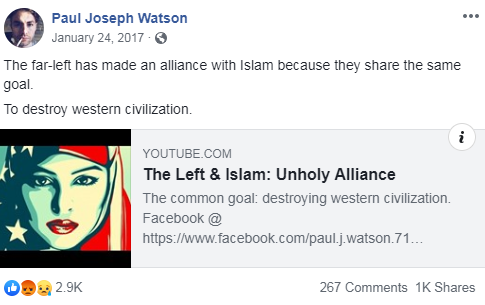
In at least two instances, Watson's social media content has been presented as evidence in murder trials involving the targeted killings of Muslims. His Twitter account was among a handful of far-right accounts frequented by Alexandre Bissonnette, the man who killed six Muslims at a Quebec City mosque in January 2017. During his sentencing hearing, the prosecution presented evidence showing that Bissonnette visited Watson's Twitter account 21 times in the month before he shot up the mosque. In the trial for Darren Osborne, the man who killed one person after plowing a van into a group of Muslim worshippers outside a London mosque in June 2017, prosecutors told the jury that the assailant had read an Infowars article written by Watson in the weeks leading up to the attack. In the article, titled “Proof: Muslims celebrated terror attack in London,” Watson wrote that "Muslims living in both the Middle East and the west show alarmingly high levels of support for violent jihad" and routinely "celebrate Islamic terror attacks."
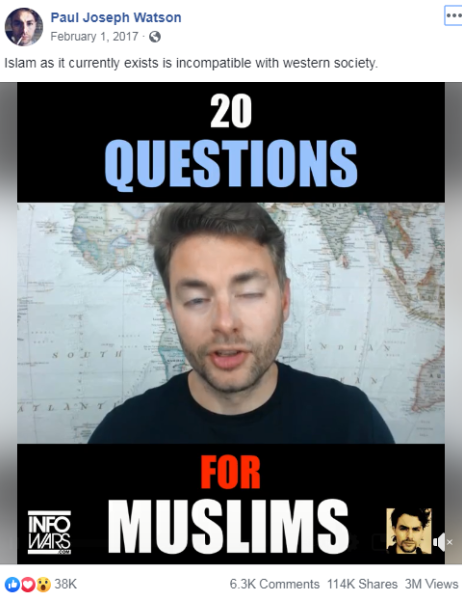
According to the U.K.-based group Measuring Anti-Muslim Attacks, which tracks Islamophobic rhetoric and anti-Muslim hate crimes, Watson has established himself as one of the most influential sources of anti-Muslim content on social media.
“Paul Joseph Watson has become 'the' nexus for anti-Muslim accounts that we have mapped. He has become an influencer in promoting information—much of it bizarre and untrue—which has been regurgitated by anti-Muslim and anti-migrant accounts time and time again,” the group’s director, Iman A'tta, told Newsweek.
Despite his prominent role as a hub for conspiratorial and inflammatory content targeting Muslims, refugees, and other groups, Watson managed to emerge unscathed after previous social media crackdowns, including those targeting his employer, Infowars. In August 2018, Infowars and Alex Jones were hit by partial bans enacted by Apple, Facebook, Spotify, and YouTube, followed a month later by Twitter. The next month, Twitter removed more accounts believed to be used by Infowars and/or Jones to circumvent the recent ban. Watson's accounts remained active throughout it all, and even today, Twitter and YouTube still provide a platform for his content. In fact, he's using those platforms to raise support after his recent ban from Facebook and Instagram.
We reached out to Watson for comment on this story, but he did not respond to our emails. He did, however, post our communication with him on Telegram Messenger, along with a note telling us to "f-ck off."
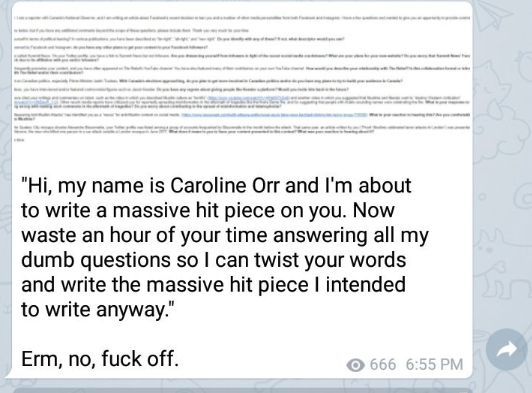
The Far-Right Media Ecosystem
One of the ways Watson has achieved such a massive reach is by establishing collaborations with ideologically-aligned media figures and activists to expand his audience, which in turn boosts his rankings on websites like Google and YouTube. These collaborations are part of what has been termed the “alternative influence network,” a tightly connected, symbiotic media system made up of individual influencers linked together by interlocking content, guest appearances, and cross-brand partnerships.
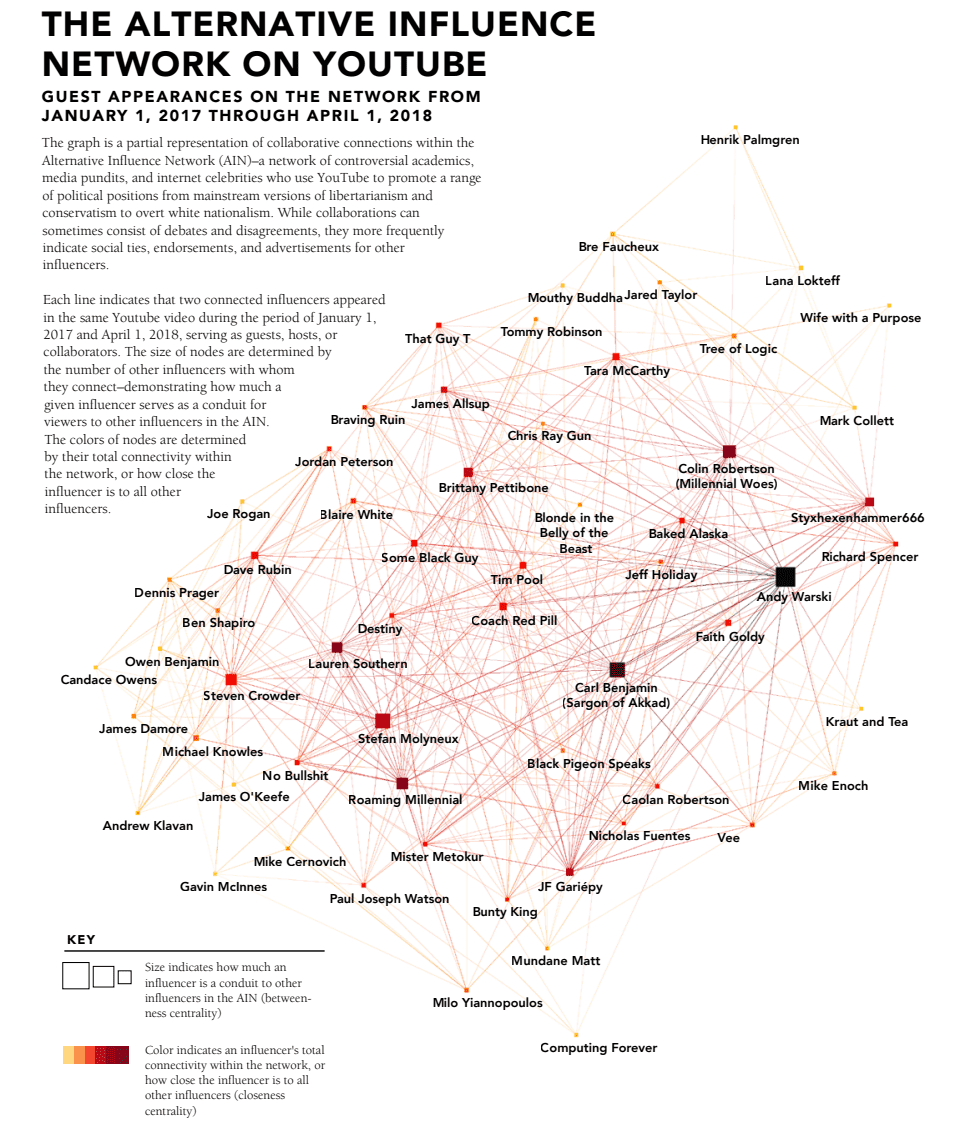
Within this network are media figures, internet celebrities, bloggers, pseudoscholars, and activists who promote a range of right-wing political positions, ranging from mainstream conservative ideas to explicit white nationalism. While the more mainstream members of the network may not personally espouse white nationalist beliefs, they frequently host those who do. This is one of the primary mechanisms through which extremism creeps into the mainstream and reaches entirely new audiences, creating the potential for radicalization.
Over the past several years, Watson has collaborated with many of today’s most notorious far-right activists and media figures, including overt white nationalists.
In January 2017, Watson interviewed Jason Kessler, the organizer of the August 2017 white supremacist rally in Charlottesville, VA, that resulted in the murder of anti-racist protester Heather Heyer. The interview focused on what Watson and Kessler described as “anti-white racism.” That topic came up again when then-Rebel Media employee Lauren Southern appeared on an Infowars program with Watson to discuss the supposed persecution of whites and promote her book, How Baby Boomers, Immigrants, and Islams Screwed My Generation.
Watson has also collaborated with far-right activist and former Rebel Media employee Tommy Robinson to produce videos such as “The Truth About the Koran,” which portrayed Muslims as a threat to Christians and more broadly, to European culture. Robinson was banned from Facebook in February for repeatedly violating the platform’s policies on hate speech, and the U.K.-based anti-extremism organization Hope Not Hate classifies him as an “Islamophobic extremist.”
Watson has an extensive, mutually-beneficial relationship with Rebel Media. Watson regularly welcomes Rebel employees onto his YouTube shows, and The Rebel frequently posts his YouTube videos on its website, featuring videos on topics such as “The Collapse of Western Civilization” and “The Truth About the Sri Lanka Attacks.” In April, The Rebel featured Watson’s commentary on the fire at Notre Dame Cathedral, which he suggested may have been an act of arson.
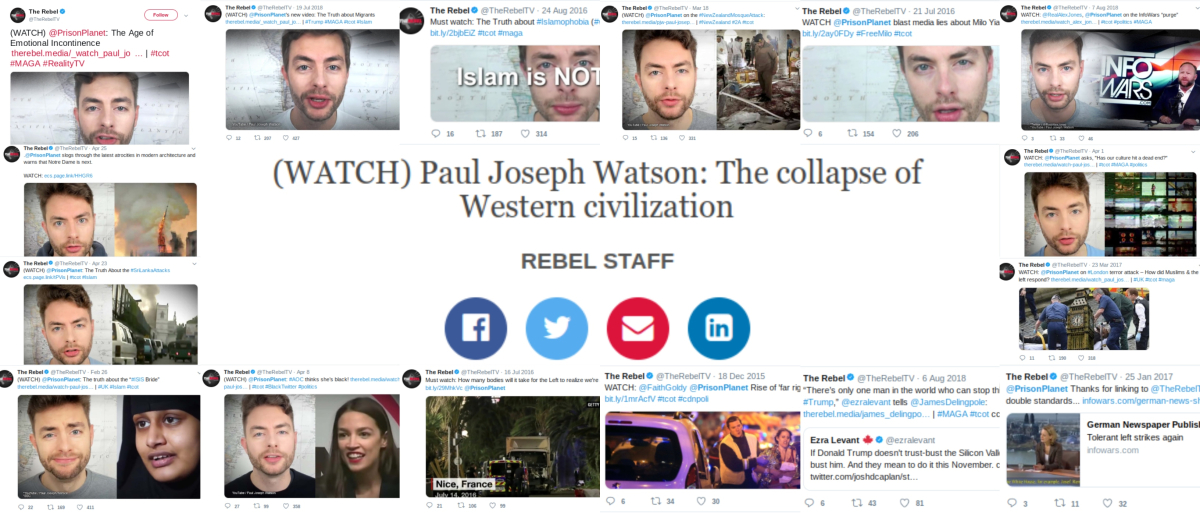
Watson has also appeared on The Rebel’s own YouTube channel alongside the site’s founder, Ezra Levant, as well as Rebel contributor Gavin McInnes and former Rebel contributor Faith Goldy. Facebook designated McInnes as a hate figure and removed his account in October. Last month, Facebook banned Goldy for violating its policies on dangerous individuals and organizations.
In addition to his partnerships with other far-right media personalities and platforms, Watson has also made an effort to boost his influence online by establishing a new website, Summit News, where he cross-posts his Infowars content. Watson announced his plans for the new site during an appearance on the Infowars program The Alex Jones Show in early March, saying that he would assume the role of “head honcho” but that the project would still involve “working together” with Infowars.
“We’re still going to be affiliated,” he said.
But Summit News is more than just an “affiliate” of Infowars. The site hosts all of Watson’s content, the vast majority of which is cross-posted (verbatim) on Infowars. Take, for instance, an article titled “The Truth About the New Zealand Mosque Attack,” which was penned by Watson just days after a gunman killed 50 worshippers at a pair of mosques in Christchurch, New Zealand, in March. In the article, Watson accused the media of “selective outrage” for failing to cover what he described as a mass slaughter of Christians in Nigeria — a claim that was debunked by the fact-checking website Snopes. Nevertheless, Watson published the content on both Summit News and Infowars, using the exact same headline, graphics, and text.
Nearly all of the content on Summit News is cross-posted on Infowars, including articles blaming refugees for bringing diseases to Europe (Summit News; Infowars), mocking concerns about Muslims being targeted by violence after the church attacks in Sri Lanka (Summit News; Infowars), and suggesting that refugees in Europe are rape apologists (Summit News; Infowars).
Watson said the goal of the new project is to “generate the next generation of YouTubers, of young political commentators,” indicating that he hopes to use the website to reach a new, young audience. He also appears to be using the new brand name to evade the social media bans imposed on Infowars and, now, on his own content.
Social Media’s Hall of Mirrors
Like nearly all mainstream and fringe websites, Summit News used Facebook to reach a wider audience by posting links to content from the site and to Watson's YouTube videos.
The existence of Summit News' Facebook page highlights the challenge of actually enforcing effective content moderation policies. Even though Facebook banned Watson and Infowars, the Facebook page for Watson’s Summit News was still active for a week after the ban, featuring links to articles that are cross-posted on Infowars. The page also included direct links to Infowars content, including an April 17 post suggesting that the Notre Dame fire may have been arson, and an April 22 post claiming that Christian churches have become the “#1 target of leftists, Muslims, and occultists.” All of this content would be banned if it was posted by Infowars or by Watson himself, but it slipped under the radar because it was posted under a different brand name.

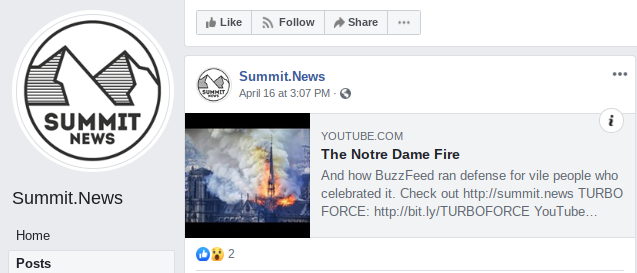
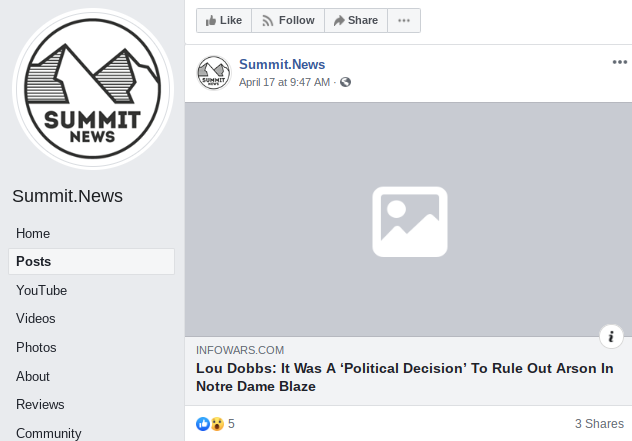
Facebook removed Summit News' page after we contacted the company to inquire about the page and clarify the scope of the recent ban on Watson and Infowars. A company spokesperson reiterated that the platform had banned Watson for violating Facebook's policies against "dangerous individuals and organizations," and said this page was being removed because it was set up to represent Watson. The spokesperson also said Facebook would continue to remove pages, groups, and accounts set up to represent Watson or any of the other banned individuals. Additionally, the company said it will remove any Facebook events if it knows a banned individual is participating in it.
For purposes of transparency, we have included our correspondence with Facebook inquiring about the page, and the company's response, below.
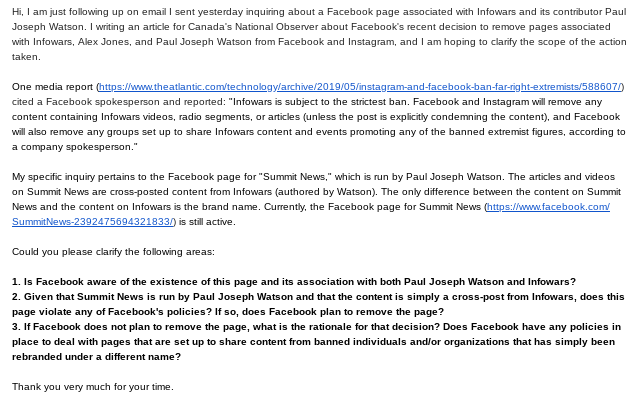

Meanwhile, Watson’s collaborations with sites like The Rebel ensure that his content is still available on Facebook, despite being banned from the platform himself. The Rebel’s Facebook page frequently posts links to Watson’s content, including recent posts featuring Watson’s commentary on the New Zealand mosque attacks, the Notre Dame fire, and “the truth about the ‘ISIS bride.’” Again, this content would be banned if it was posted by Watson, but because The Rebel's page was not set up to represent Watson, it is not violating Facebook's policies by posting his content.
The fundamental challenge here is that influencers like Watson are not created in a vacuum. They’re the product of an interconnected network that functions like a hall of mirrors, with each influencer assuming the role of a node “around which other networks of opinions and influencers cluster.” Within this network are multiple platforms where content is cross-posted, narratives are crafted, and brands are cultivated. Removing one, or even a handful, of these individuals from a platform (or two) is not the same thing as dismantling the network that keeps them afloat.
Notably, Facebook acknowledged this network dynamic in a statement explaining why it took action against certain accounts, citing their collaborations with other banned accounts:
First in December and again in February, Jones appeared in videos with Proud Boys founder Gavin McInnes. Facebook has designated McInnes as a hate figure.
Yiannopoulos publicly praised McInnes and British far-right activist Tommy Robinson, who Facebook has designated as a hate figure.
Loomer appeared with McInnes in December, and more recently declared her support for far-right activist Faith Goldy, who was banned after posting racist videos to her account.
This suggests that Facebook is at least aware of the broader ecosystem in which these individuals operate, and took that into consideration when it banned some of the most active collaborators. Yet by leaving pages like Summit News untouched for a week — until it was brought to the company's attention — Facebook is sending a message that it will allow banned content on its platform as long as the brand is disguised just well enough to avoid coming under scrutiny and creating more controversy for the already embattled tech giant. If recent history is any indication, that message will be heard loud and clear by bad actors, who will take it as permission to keep exploiting the loopholes that exist in within Facebook's policies.
Facebook's current approach is little more than a band aid — a temporary fix to stop the bleeding without treating the underlying cause. Stemming the flow of disinformation and extremism online will require an approach that targets the network in which these influencers thrive. It won't be a one-step solution. Social media companies must start implementing proactive policies that get ahead of the problem, rather than waiting to take action until it becomes too big to ignore.
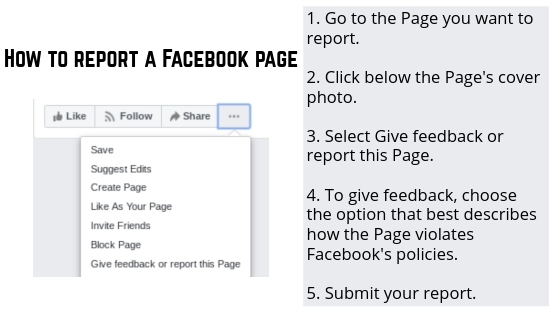
Perhaps most importantly, tech companies must finally step up and take responsibility for their role in facilitating extremism, and more broadly, in providing a platform for far-right actors to hijack democracy by spreading disinformation, manufacturing outrage and fear about immigrants and minority groups, and undermining trust in the independent press. Social media didn't create the deep social divisions that exist around issues like race, immigration, and religion, but it does provide a channel for far-right authoritarians to exacerbate those divisions, even within the confines of a democracy.
Political scientist Ronald Deibert, the director of the University of Toronto's Citizen Lab, argues that “social media [platforms] not only are compatible with authoritarianism; they may be one of the main reasons why authoritarian practices are now spreading worldwide."
The stakes could not be higher, particularly with Canada's elections approaching in less than six months. It's not an overstatement to say that the future of liberal democracy rests in part upon the shoulders of social media companies. Let's hope they're up for the job.
As part of the Election Integrity Project, National Observer is tracking disinformation, social media manipulation, and the spread of hate online. We'll be keeping a close watch on things, but we need all the eyes and ears we can get, so if you see examples of this type of activity, please let us know. You can reach Caroline Orr at [email protected] or on Twitter at @RVAwonk.
Editor's note: This article was updated at 6:03 p.m. ET on May 10, 2019 to correct a typo.







Comments
I don't know how it happened but Huffington Post suddenly appeared in my inbox about (?) twelve months ago and from time to time I read a few of its articles but when I looked at the comments sections I was somewhat surprised at the frequency of the same names popping up and 90% of them taking the opportunity to spew some nonsense or other (to put it politely) about the prime minister, other ministers of the crown, celebrities, royals, ad nauseum. Too many of these comments were ignorant and evil intentioned disparagements of women, people of colour, "liberals" NGO's engaged in humanitarian work etc.
At one point I wrote to Huffpost to ask why they permitted these anonymous trolls so much space for commentary. Huffpost did not reply and since I do not use social media at all I was unable to put my question directly to the trolls.
Recently I unsubscribed HuffPost (despite never having subscribed in the first place) when I came to the conclusion that the most ubiquitous of the trolls were either clones or puppets of people like Watson. Their language was suspiciously identical and boringly predictable. They need to consult a thesaurus to avoid using the same words all the time. Even their invented words of insult are unimaginative. Nothing they write rises to the level of the notable political satirists of the English language. Thus do they debase white supremacy.
Thanks for sharing this, Betsy. That's a really interesting observation, and I wonder if there might be more beneath the surface. If you come across more examples like this (where you see the same names or nearly-identical comments posted repeatedly on different stories or different websites), I would love to know more about it. You can reach me at [email protected]. Thanks again for sharing your observations.
Nice first piece Caroline. Welcome aboard. These people are very clever in the way they rebrand their messages and regain access to Twitter, Facebook, etc. But somebody like Donald Trump is implicitly encouraging white supremacy and explicitly violating the U.S. constitution. Shouldn't he also be removed from these social media websites. Donny the Dictator obstructs justice, therefore I impeach the so-called President.
Thanks so much for the warm welcome. It is definitely striking to see how Donald Trump has really changed the norms for discourse online. Unfortunately, the so-called "Trump Effect" seems to have gone global, and it's appearing everywhere from the U.K. to Canada to Australia and beyond. It's going to take a lot of persistent and unwavering public pressure on social media companies to change things, but I hold out hope that we can "make our information space great again." :)
It’s all so tiresome. The people you refer to are called “e-celebs” and are looked down on by the folks you really should be worried about. Improving background checks for firearms purchases are about all you can do, sadly.
Yes it is tiresome but it is also powerful. Who was it that said that the pen is mightier than the sword? It may sound corny but in politics it is true. Pens write laws. Laws can control guns. Pens and speech can also be used to spread anger, hatred and divisiveness.
If you live alone on a desert island you may be able to safely ignore these tiresome people, but I suspect that you do not? :)
This is a really important point, especially as we approach the federal election in Canada. People with large social media audiences have the potential to reach and influence vast numbers of people with hate speech and disinformation, which has serious implications for the democratic process. And you are absolutely right that those who are targeted and affected by hate speech don't have the option to ignore it, even if they wanted to.
Utter garbage.
It’s called free speech. If Facebook et al continue gatekeeping content then they are going to get regulated.
They need to cease and desist and let the courts decide what is libel defamation and inciting violence. Just like the telcos do.
And what about the far left posters? Shouldn’t they be banned too?
Surely Gord, as a philosopher you understand that there must be limits on free speech? How about when that speech is clearly and intentionally fabricated to hurt others?
Or perhaps it is that you are unaware of your own biases and are ‘thinking fast, not slow’ in reading Ms. Orr’s article and have thus already fallen under some sophists’ spell?
Will your dismissiveness shield you if some day in some distant crowded movie theatre you find yourself trampled when someone else falsely shouts ´Fire!’ to elicit panic? Probably not.
In the natural world truth and evidence have no ideology.. Falsehoods and extremisms on the other hand are human constructs designed by humans for human purpose. In this case both ideological and harmful purpose.
Ms. Orr’s article seems to be purely about concern over the harmful. A less than subtle aspect that in thinking fast perhaps you may have too quickly dismissed?
I would say Watson pretty much pegged Caroline on the money. Yes thismisma leftist hit piece. All the typical code words were used, alt right, extremist, islamaphobe... wonder how much of turdeau payoff money to media went in her pocket.
This is a very thoughtful and well-reasoned take on the "free speech" issue. In recent years, purveyors of hate speech and disinformation have gotten very good at hiding behind the banner of free speech to avoid facing accountability. Of course, free speech is a fundamental tenet of democracy — but the right to live without fear of violence based on one's religion, skin color, race/ethnicity, gender, sexual orientation, or country of origin is an even more fundamental right. You are correct in your assessment that we can have free speech while still leaving room for protections from dangerous and harmful speech.
Re: P.J Watson. How he must love that photo! The faux serious intellectual frown, the piercing fanatic gaze and the requisite Che Guevara revolutionary facial hair! What a poseur! Too clever by half and too derivative. Destined to disappear from history without even a footnote.
That map is his favorite background image ;) He uses it in many of his videos, which is ironic because he proclaims to be "anti-globalism."